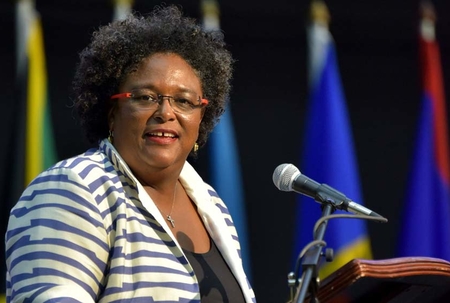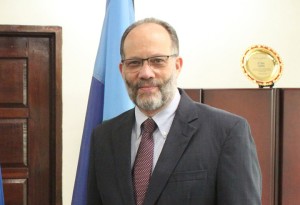March 8, 1998 marks the eighty-fourth year that the world will be commemorating International Women's Day. As we, in the Caribbean, take pride in the progress we have made in furthering the objective of regional integration and prepare to celebrate the twenty-fifth anniversary of the signing of the Treaty of Chaguaramas this July, we must also take stock of progress in moving our Region towards the imperative of gender equality and social justice.
The CARICOM Post-Beijing Regional Plan of Action to the Year 2000 is the broad framework for the efforts in the Region to achieve gender equality. In 1997, this document was published and widely disseminated thereby bringing the issues and activities being undertaken to a much wider audience. The work, Towards Regional Policy on Gender Equality and Social Justice was also completed and is expected to inform policy discussions on the issues which are on the Post-Beijing Agenda.
Within Member States, the problem of violence against women dominated the agenda. For example, St. Vincent and the Grenadines Women's Affairs Bureau produced a booklet on Understanding Domestic Violence. The British Virgin Islands commissioned a study to investigate its causes, and Grenada and Trinidad and Tobago established domestic violence hot lines for victims and perpetrators and launched a public relations campaign. The Government of Trinidad and Tobago has gone further to establish a Domestic Violence Unit to deal with this issue.
It is clear that violence against women in general, and domestic violence, in particular, constitute serious social problems for our Member States – problems which do not appear to be easily remedied. As we noted on the occasion of the International Day to Protest Violence Against Women on 25 November 1997, the situation calls for “the development of new and creative approaches to the problem, among them being sensitisation of the public that violence is unacceptable for settling disputes, as a means of entertainment and as an expression of power”.
While domestic violence was a major focus across the Region, attention was also paid to poverty alleviation strategies, leadership training for women, legal reform and gender main streaming.
Poverty alleviation efforts ranged from training for women in non-traditional areas, in The Bahamas and St Vincent and the Grenadines, to legal reform in the areas of child maintenance and paid maternity leave.
In respect of leadership training, Guyana has established a Leadership Training Institute for Women, and Trinidad and Tobago plans to establish a similar facility.
In the area of legal and constitutional reform, CARICOM Model Legislation, covering Citizenship, Domestic Violence, Equal Pay, Inheritance and Sexual Harassment, was widely distributed throughout the Region. At the national level, Jamaica, Saint Lucia and Trinidad and Tobago are addressing such issues as Citizenship; Equality of Opportunity and Treatment in Employment; and Evidence in Court. A Family Court has been established in Saint Lucia, and Barbados is reviewing its Constitution to correct certain areas of gender discrimination.
Gender main streaming is being attempted through gender training at various levels, cross-ministerial collaboration, public education, and the development of gender statistics. In the CARICOM Secretariat itself, we are undertaking a survey among Secretariat staff, with a view to designing and implementing appropriate gender training interventions which may be necessary to ensure that, in this institution, we pay due regard to the issue of gender equality in our daily work.
It is indeed heartening to note and commend the various activities which have been undertaken to address, in practical ways, the needs of women and wider strategic gender interests. Nevertheless, we in the Caribbean Community would want to record greater success in 1998 in the battle to eradicate violence against women.
In this regard, we call on all citizens of the Caribbean Community – men and women – to work towards achieving this goal.
We must also increase our efforts to alleviate poverty, which has been shown to disproportionately affect women, and to increase the participation of women in decision-making at all levels, especially at the national political level, so that the wider social benefit of enabling and empowering our women can be achieved.
I cannot end this message without reference to CARICOM's achievements at the international level. The Georgetown Consensus produced by the Post-Beijing Caribbean Ministerial Meeting of August 1997 was incorporated, almost in its entirety, in the Santiago Consensus which emerged from the Seventh Regional Conference on the Integration of Women into the Economic and Social Development of Latin America and the Caribbean, held in Chile in November 1997.
Further, the Director of the Women's Bureau of St Kitts and Nevis, Ms Rosalind Hazelle, achieved the honour of being elected in February 1998 to serve as an expert on the Committee for the Elimination of All Forms of Discrimination Against Women (CEDAW). She will begin her four-year term in January 1999. On behalf of the Caribbean Community, I extend sincere congratulations to Ms. Hazelle on her recent achievement.
Finally, on behalf of the staff of the CARICOM Secretariat and myself, I extend warm greetings to the Women of the Caribbean Community for a successful International Women's Day 1998 and for a year of accelerated action towards achieving gender equality in our Region.





